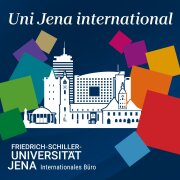
Students at risk, for example from Afghanistan, please note our information about the Hilde Domin Programme (DAAD).
In Jena, there are no tuition fees (unless students have studied for a very long time in Germany already). However, you should be prepared to spend approximately €750-900 per month for living costs. You can find a detailed breakdown of costs in the study guidepdf, 13 mb · de. International students should always be able to provide evidence of sufficient financial resources (2025: €11,904/year; language course: 12.324€/year) to the Visa Office and Immigration Office. Having a student’s residence permit, you have to cover the cost of living yourself and should not apply for any benefits from Germany (e.g. housing benefit for rent or social security).
Thus, before you apply for and begin a study programme, you should carefully consider how you will finance it. On this page, we provide information on various methods of financing and scholarships for international students.
-
Bank account and blocked account
For recurring payments like rent, health insurance, mobile phone/internet, broadcasting fee (see point 4 below) and much more you will need a bank account.
If you are an EU citizen and have an account in the EU (SEPA), you can use it.
All degree-seeking students from outside the EU (also for the DSH course) will need a blocked accountExternal link (or online blocked account) at a German bank, at least for their first year of studies (amount: 11,904€/year; DSH course: 13.092€/year). Find further information about blocked accounts at the website of MyGermanUniversityExternal link; the University of Jena ist not resonsible for the Information published there.
After arrival, open a blocked account here at your place of residence in Germany (or activate your blocked account, which you had to open for the visa application). Some banks require a minimum term and/or a valid visa/residence permit. There are also online banks which offer blocked accounts.
When choosing your bank, pay attention to the monthly fees and conditions, terms and cancellation periods, costs for all services associated with the account.
The following list is in alphabetical order and does not convey any recommendations.
- Banks in Jena: CommerzbankExternal linkExternal link, Deutsche BankExternal linkExternal link, HypovereinsbankExternal linkExternal link, PostbankExternal linkExternal link, SantanderExternal linkExternal link, SparkasseExternal linkExternal link, VolksbankExternal linkExternal link.
- Online banks: ExpatrioExternal linkExternal link (also blocked account), FintibaExternal linkExternal link (also blocked account), N26External linkExternal link. All of the banks named above also offer online accounts.
-
Jobs: Working while studying
If you want or must work while studying, please make sure you stick to the rules of your study programme, i.e. do not work more hours per week than allowed. Studying should be your priority.
When looking for a job, please observe the requirements of the German Immigration Law: non-EU citizens whose main reason for staying in Germany is studying can only work for 140 days (up to 8 hrs/day) or 280 half-days (up to 4 hrs/day) per year without a special work permit. It is recommended to document all working hours in a list. Employers must be informed if you have more than one job. The limit does not apply for work as a student assistant (“studentische Hilfskraft”) or graduate assistant (“wissenschaftliche Hilfskraft”). Studying part-time or taking on a free-lance/fee-based job (self-employment) is allowed only if the Immigration Office permits it.
- Please see the information about legal rules
- You may get advice and councelling at the Agentur für ArbeitExternal link or the ThaffExternal link.
There are various job opportunities in Jena. You should have at least good command of German if you want to have a choice among them. Jobs in which you do not need (much) German are rare, opten physically demanding, not very well paid and usually you have to commute to Erfurt/Gera for them.
Accept a work offer only if you have an employment contract and your employer is also paying social security contributions for you. Those working illegally may be liable to prosecution.
- General advice (tips and matters) [pdf, 203 kb] depdf, 138 kb · de
- University job boardExternal link
- Studierendenwerk’s job boardExternal link
- Jobs in JenaExternal link
- Welcome Centre Thuringia job databaseExternal link
- Tips on applyingExternal link
- Living and working in Thuringia: STAY projectExternal link
Get advice and more information about your job search at the Career PointExternal link!
-
Scholarships
You usually have to apply one year in advance for a scholarship. Please read the application criteria thoroughly. Not all the scholarships listed on the following pages are available to international students.
- DAAD scholarship databaseExternal link (only includes DAAD scholarships)
- Information for doctoral candidates
- BaföGExternal link (international students can only receive BaföG in exceptional cases)
- www.uni-jena.de/en/deutschlandstipendium
- stipendiumplus.deExternal link
- sbb-stipendien.de/weiterbildungsstipendium.htmlExternal link
- Jenaer Uni-Botschafter*innen Stipendium (JUBoS) de
Guest students: please refer to our special advice on financingExternal link or ask your home University. The Erasmus+ Worldwide programme at the Friedrich Schiller University Jena also provides scholarships for guest students from some of our partner universities. Learn more about it here.External link
-
Loans
Borrowing money, privately or from a bank, is always associated with the risk that you have to ensure repayment and often also pay interest. So the repayment should not be in a phase when you cannot work alongside your studies/exams. Also avoid borrowing money again for the repayment.
For a bank loan or a loan from the Studierendenwerk (exception: short-term loan, see Emergency assistance below), you must provide the guarantee of a German citizen to ensure repayment. Only ask people whom you know well and trust. If you borrow money privately, you should have a written contract about the sum and the mode and time of repayment.
-
Emergency assistance
In the event of an emergency (sudden, unexpected and unforeseeable emergency, e.g. illness), international students without a German higher education entrance qualification Abitur who have been degree-seeking students at the Friedrich Schiller University Jena for at least one year already, can request emergency assistance from the International Office at any time. Please observe the requirements in the general informationpdf, 81 kb · de [pdf 63KB]. You may only submit applications after consultation with Dr Salheiser, Team International Students of the International Office for advice. The commission responsible for granting study allowances, chaired by the Vice-President for Learning and Teaching, will decide on the applications.
You can apply for short- and medium-term hardship loansExternal link or even free tokensExternal link for the canteen from the Studierendenwerk Thüringen.
-
Student grants from DAAD for the final phase of your studies
For the last semester, international students without a German higher education entrance qualification Abitur who are aiming for a degree at the University of Jena can request student grant for the final phase of their studies from the International Office. Applications can only be made in the last but one semester before the final/exam semester. The application deadlines are 28 February and 31 August of each year. Please take note of the general informationpdf, 81 kb · de. [pdf 63KB] You may only submit applications after consultation with Dr Salheiser in the International StudentsExternal link department of the International Office for advice. The commission responsible for granting study allowances, chaired by the Vice-President for Learning and Teaching, will decide on the applications every March and September.
Logo DAAD
Image: DAAD -
Commitment scholarships for international students
Occasionally, the International Office awards student scholarships for particularly active students who help international students to integrate. More information
All calls for applications are published in the calendar.
-
DAAD prize for special achievements by international students
You can find information on the application hereExternal link.
-
Study Start-Up aid "StudiumThüringenPlus"
The "StudiumThüringenPlus" study start-up aid is a one-time support amounting to €500 for freshmen in financial need before the start of their studies in the first university semester. The "StudiumThüringenPlus" study start-up aid intends to ease the start into studies.
You can also listen to these information and advices in the following episodes of our Podcast "Uni Jena international" .

This episode is about financing your studies.

The Studierendenwerk informs about loans and vouchers
If you have any questions or need advice, please contact Dr Britta Salheiser, Team International Students of the International Office.
